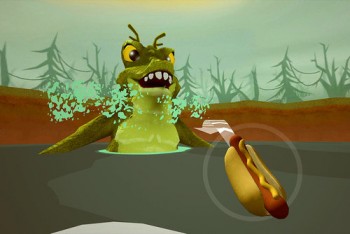
Matt Hyde discusses the inspiration and process behind Sea Hero Quest VR.
What sparked the idea for Sea Hero Quest VR and how did it change over time?
Sea Hero Quest was born out of a need to approach global health problems in innovative ways. Dementia is one of the world’s biggest health threats with 50 million people currently living with the disease and that number expected to grow to 130 million by 2050. In 2018 it will have a US $1 trillion economic impact worldwide. In 2016 we developed Sea Hero Quest for mobile to disrupt data collection methods and create the first global benchmark for how humans navigate. Assessing one’s spatial ability is an important stage in the diagnosis of dementia. After the success of the mobile game, we saw a clear opportunity to generate richer and more precise data by using VR technology. Sea Hero Quest VR offers a higher level of tracking precision, capturing yaw (y axis), pitch (x axis) and roll (z axis) data. This means we can track richer and more complex player behaviours such as the action of turning the head around while exploring an environment. This is a crucial behaviour we exhibit when we naturally navigate the real world. VR also allowed us to expand on the game narrative and gameplay, adding an additional experiment called the Morris Water Maze, a gold standard in behavioural neuroscience research, that wasn’t possible on mobile.
Who is the game targeted at?
The data collected from Sea Hero Quest VR gameplay will help scientists understand how humans navigate and develop rich data and deeper insights that will contribute towards developing diagnosis and treatment tools for dementia. The data collected from gameplay is currently being analysed by UCL and other scientists will have the opportunity to request permission to use it for research purposes. In order to develop a comprehensive understanding, we need as many people between the ages of 16 to 80+ to play the game. We’ve found that the VR is even more accessible to older audiences and those new to playing games due to the ‘pick-up-and-play’ nature of a VR headset, and the simple and intuitive control scheme.
Why did you feel it was important to make a game like this?
The games industry has long been leaders in creating innovative technologies, storytelling and engagement techniques for entertainment – there is clear opportunity for this talent to also contribute to developing products that help to solve some of the biggest challenges facing the world.
What research or collaborations did you undertake to inform the game?
Sea Hero Quest VR was developed in partnership with a number of world-leading dementia scientists, spatial navigation consultants and data security specialists. We worked closely with leading neuroscientists and dementia experts, Dr Hugo Spiers and Professor Michael Horenberger, to adapt spatial navigation and memory tests into engaging gameplay that would output valid scientific data. Deutsche Telekom, who facilitated the project, are also key partners in data storage and security, hosting all game data in T-Systems in Germany. Other partners included global communications agency, Saatchi & Saatchi London, and Alzheimer’s Research UK.





